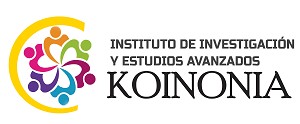Modelo de gestión estratégica de Talento Humano para el Instituto Ecuatoriano de Seguridad Social
Resumen
La investigación tuvo por objetivo diseñar un modelo de gestión estratégica de Talento Humano para el Instituto Ecuatoriano de Seguridad Social Azogues – Ecuador. Se generó desde una tipología metodológica descriptiva con diseño no experimental. Se evidenció que no existe compensación a los funcionarios, las capacitaciones no se realizan en función a las estratégicas y necesidades institucionales, influyen de manera directa con el cumplimiento de los procesos organizaciones que encadena retraso en el desarrollo de competencias individuales. Este modelo de gestión estratégica aportará en la productividad eliminando las fallas en los procesos y optimizando los recursos. En el proceso de aplicación de las encuestas se constató que el personal reconoce a la Unidad Administrativa de Talento Humano como un proceso estratégico, sin embargo, no cubre por completo sus necesidades. Se evidenció que la Institución, posee una estructura organizacional definida, bajo lo cual desarrolla los procesos.
Descargas
Citas
Alles, M. (2008). Naturaleza de los Individuos. En M. Alles, Comportamiento Organizacional. Como lograr un cambio cultural a través de la gestión por competencias (p. 33). Buenos Aires: Ediciones Granica S.A.
Armijos-Mayon, F, Bermúdez-Burgos, A, & Mora-Sánchez, N. (2019). Gestión de administración de los Recursos Humanos [Management of Human Resources]. Revista Universidad y Sociedad, 11(4), 163-170.
Barrios-Hernández, K, Olivero-Vega, E, & Figueroa-Saumet, B. (2020). Condiciones de la gestión del talento humano que favorecen el desarrollo de capacidades dinámicas [Conditions of human talent management that favor the development of dynamic capabilities]. Información tecnológica, 31(2), 55-62. https://dx.doi.org/10.4067/S0718-07642020000200055
Bustos-Farías, E, Cerecedo-Mercado, M, & García-González, M. (2016). Modelo de gestión de conocimiento para el desarrollo de posgrado: estudio de caso [A Knowledge Management Model for Graduate Development: a case study]. Revista electrónica de investigación educativa, 18(1), 128-139.
Cerón-Gordón, J, Atiencia-Aucancela, E, López-Aguirre, J, Fernández-Vinueza, D, & Llangara-Arellano, V. (2017). Estrategia de fortalecimiento en el talento humano [Strategy for strengthening human talent]. CE Contribuciones a la Economía. Recuperado de https://n9.cl/ehz5b
Chávez, L. V. (2015). Gestión del Talento Humano [Human talent management]. Riobamba: La Caracola Editores.
Chiavenato, I. (2002). Gestión del Talento Humano [human talent management]. México: McGraw Hill.
Chiavenato, I. (2004). Introducción a la Teoría General de la Administración (Séptima Edición ed.). México: McGraw-Hill Interamericana.
Chiavenato, I. (2009). Gestión de Talento Humano. México: Mc Graw-Hill.
Chiavenato, I., & Sapiro, A. (2017). Planeación estratégica. Fundamentos y Aplicaciones [Strategic planning. Fundamentals and Applications] (Tercera edición ed.). México D.F: MCGRAW-HILL INTERAMERICANA EDITORES, S.A. de C.V.
Corrales-Morales, D. (2009). Estrategia de Recursos Humanos de Avantek del Norte S.A. http://hdl.handle.net/2238/2832
Delaux, H. S. (2017). Modelo de Gestión Estratégica de RRHH en Organizaciones del Estado [Model of Strategic HR Management in State Organizations]. Europa: Redactum.
Ley de Seguridad Social. (2011). Registro Oficial Suplemento 465 de 30-nov-2001. Recuperado de https://n9.cl/zdvc
Ley Orgánica del Servicio Público, LOSEP. Registro Oficial Suplemento 294 de 06-oct.-2010. https://n9.cl/85zgn
Marín-Samanez, H, & Placencia-Medina, M. (2017). Motivación y satisfacción laboral del personal de una organización de salud del sector privado [Work motivation and job satisfaction of a private health care organization staff]. Horizonte Médico (Lima), 17(4), 42-52. https://dx.doi.org/https://doi.org/10.24265/horizmed.2017.v17n4.08
Pérez-Montejo, A. (2009). Evaluación del desempeño laboral [Job performance evaluation]. UPIICSA XVII, VII, 50-51.
Pico, L. M. (2016). La gestión del talento humano, recurso indispensable para la organización en el entorno competitivo actual [The management of human talent, an indispensable resource for the organization in today's competitive environment]. INNOVA Research Journal, 1(11), 97-104. https://doi.org/10.33890/innova.v1.n11.2016.122
Quesada-Quecan, L. (2014). Gestión del talento humano, como promotor del desarrollo organizacional. [Management of the human talent, as promoter of the development organizacional]. Recuperado de http://hdl.handle.net/10654/11842
Stoner, J. & Wankel, Ch. (1990). Administración. Prentice may. México.
Ulrich, D. (2000). Recursos Humanos Champions: cómo pueden los Recursos Humanos cobrar valor y producir resultados. Buenos Aires: Granica.
Werther, W. B. (2016). Administración de Personal [Personnel Administration]. México: McGraw Hill.
Zuin-Secco, F, & França-da-Cunha, C, & Spers, E, & Galeano, R, & Ragazzo-Corrêa-da-Silva, R. (2016). Etapas de la planificación estratégica de marketing y el ciclo de vida organizacional: estudio de una empresa de gestión familiar [Stages of strategic marketing planning and the organizational life cycle: study of a family-run company]. Invenio, 19(36),65-87.
Derechos de autor 2021 Janeth Gabriela Molina-Romo

Esta obra está bajo licencia internacional Creative Commons Reconocimiento-NoComercial-CompartirIgual 4.0.
CC BY-NC-SA : Esta licencia permite a los reutilizadores distribuir, remezclar, adaptar y construir sobre el material en cualquier medio o formato solo con fines no comerciales, y solo siempre y cuando se dé la atribución al creador. Si remezcla, adapta o construye sobre el material, debe licenciar el material modificado bajo términos idénticos.
OAI-PMH URL: https://cienciamatriarevista.org.ve/index.php/cm/oai














